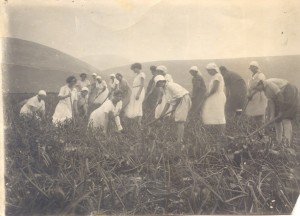Women today find it hard to unite for the sake of a common cause. I mean, really unite – not simply share views on social networks, go to empowering women’s meetings, or vote for candidates who vow to promote feminist issues. Most of us, I believe, feel that in the daily struggle with discrimination we stand alone. We may gripe about it, take some action once in a while, but nothing more. However, profound social change probably requires an altogether different sense of commitment.
A relatively unknown part of Zionist history is the role of women – their aspiration to be equal partners in this revolutionary movement. ‘Revolutionary’, because Zionism aimed not only to create a homeland for the Jewish people but also to change the Jewish character, to form a ‘new Jew’ (the ‘Sabra’). Those early Zionists saw the Jews living in the Diaspora as weak and unproductive. The ‘New Jew’ would be strong, able to defend himself, and productive. And in the eyes of Herzl and his contemporaries, productivity meant one thing: engaging in agriculture.
In the late nineteenth century some Jews from Eastern Europe settled in Israel, then Palestine, with the hope of fulfilling the Zionist vision. First came some families, and then groups of socialist single men – with a very few young women – eager to make the barren land bloom. The Arab-Israeli conflict was still in its infancy. The real threats were death from starvation or malaria.
The women – the very few who dared to travel to this god-forsaken place – were expected to work in the kitchen, wash the men’s clothes, and perhaps engage in some limited home-based farming. To be historically fair, this was before voting rights were granted to women both in the UK (1928) and in the USA (1920). But some of these girls were determined to take full part in the Zionist endeavor.
In 1911 Hannah Meisel, a Russian immigrant with a PhD in agronomy, decided to establish a women’s farm, an agricultural training institution for young, unmarried women. She called it ‘The Young Women’s Farm’ (Havat ha’almot). Leasing a room from a Jewish settlement next to the Sea of Galilee, she came with two students; four others joined her later. The girls, sixteen or seventeen years old, were eager to master every theoretical and practical aspect of agronomy.
You would think the young men already settled there would have welcomed them. They did, but only as long as they were willing to take care of the cooking and laundry. At first the girls and the teacher lived in one room, with neither floor nor windows, but eventually the school had its own house. And other girls quickly followed the first students. The rumor of this revolutionary school for young women spread in Zionist circles, to the point that Hannah had to reject some of the applicants since there was room for only twenty girls at a time. One famous student was Rachel the Poetess.
The girls worked in the fields for eight hours a day and their evenings were devoted to general education. They specialized in growing unique kinds of orchards and vegetables. They established a nursery that provided hundreds of olive, lemon, almond, and eucalyptus seedlings for other farms. They began the experimental planting of bananas, today a common crop in this part of Israel. Their eucalyptus trees were used to dry the swamps that inflicted malaria and other diseases. They had a productive dairy barn, and the decorative flower garden was another of their innovations.
Hannah, in spite of her revolutionary spirit, was an extremely practical person. She thought that after two years of schooling the girls would marry and settle down with a husband and children, and therefore insisted they should also learn ‘household management’: cooking, sewing, cleaning. Her aim was to create a farmer’s wife with some agricultural skills. But the girls, now an integrated group of determined young women, who had endured hardships and maladies, developed an altogether different image of their role in society. They wanted to engage in agriculture as their main vocation, not just for the sake of supporting a husband.
The protests against ‘household management’ evolved into an open rift with Hannah, whom the girls now called ‘our older sister’. “What sort of subject is that?” they wondered. Some cleaned the kitchen out of respect for her, others openly refused, and some pretended to clean it but left the oven and pots dirty. The spirit of feminism that developed within the group could not be shaken even by the fierce stand of the respected teacher.
It is most likely that if Hannah had had only one or two students, they would have adopted her worldview. But the united group she created formed new perceptions of gender role, more radical than her own; they wanted a new life style. Their mutual support made the different, innovative feminine identity possible. In many ways they were ahead of their time, a true ‘avant-garde’.
The women’s farm lasted for six and a half years. The outbreak of WWI created new, insurmountable obstacles. Yet the determination and collective spirit of these young women had a profound and long-lasting affect on women’s role in Israeli society. If you had asked Hannah, she might have said their influence was somewhat too extreme.

So true! Thanks
s I supposed once the spirit of freedom is tasted, its difficult to go back to the old diet of subjugation. Thanks for communicating this part of history